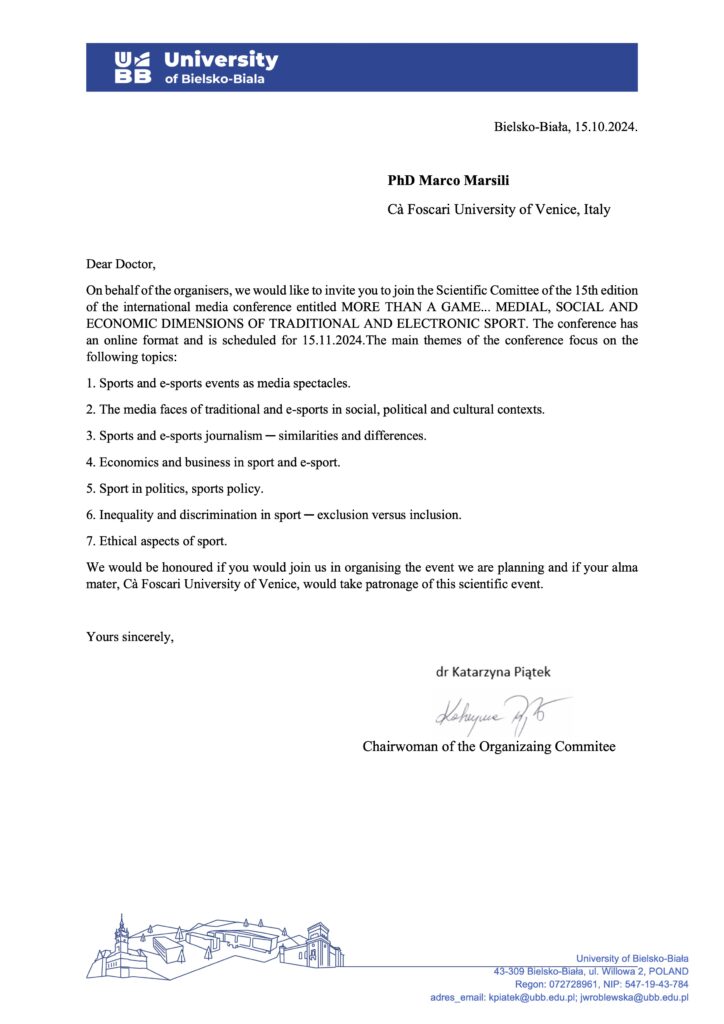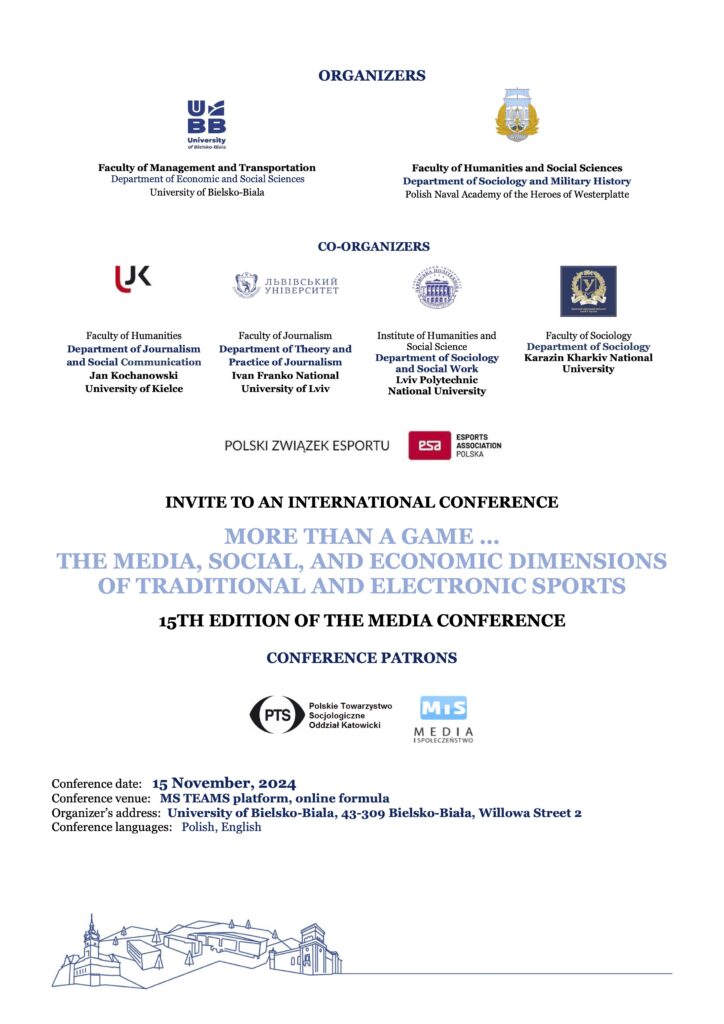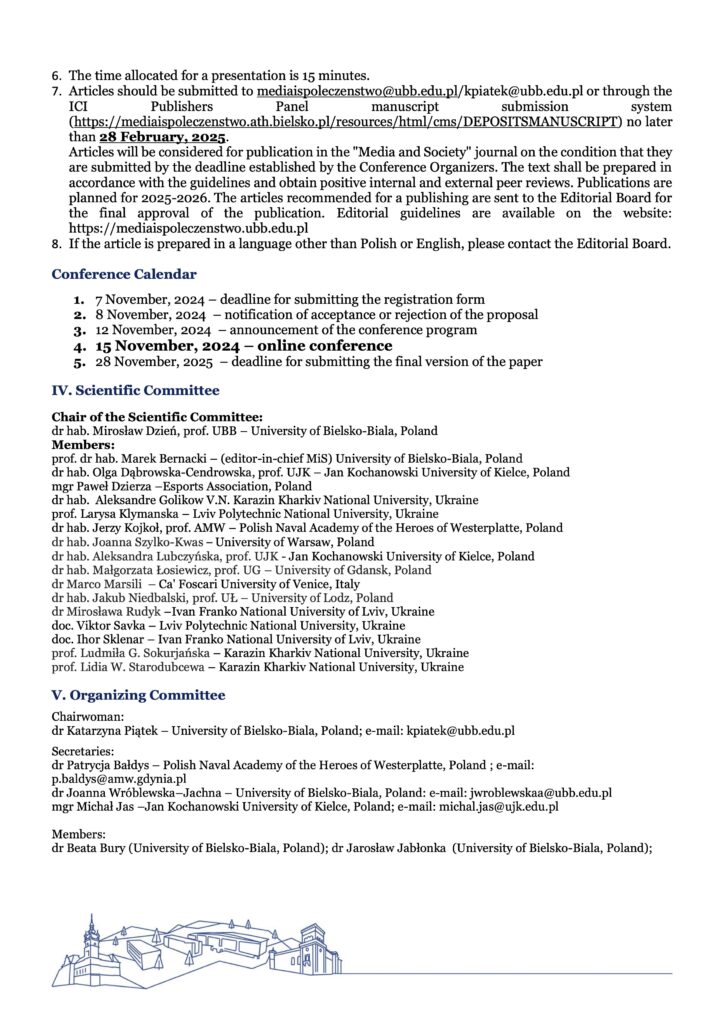Upon request of dr. Katarzyna Piątek, chairwoman of the Organising Committee of the 15th edition of the International Scientific Media Conference entitled “More than a game… Media, Social and Economic Dimensions of Traditional and Electronic Sports”, I accepted the invitation to join the Scientific Committee of the conference that will be held on 15 November 2024 at the University of Bielsko-Biala (Poland) and hosted on the MS TEAMS platform, online formula. I will also chair a panel titled “Sport as a Weapon of Mass Distraction in the Digital Age” (submissions until 7 November, 2024 through the dedicated form: https://forms.office.com/e/KV22ahTt5X).
The conference, that will be held in Polish and English, is organised by the Faculty of Transportation and Management, Department of Economic and Social Sciences and the Faculty of Humanities and Social Sciences, Department of Polish Studies, University of Bielsko-Biala, co-organised by the Faculty of Humanities and Social Sciences, Department of Sociology and Military History, Polish Naval Academy of the Heroes of Westerplatte, the Faculty of Humanities, Department of Journalism and Social Communication, Jan Kochanowski University of Kielce, the Faculty of Journalism, Department of Theory and Practice of Journalism, Ivan Franko National University of Lviv, and the Institute of Humanities and Social Sciences, Department of Sociology and Social Work, Lviv Polytechnic National University.

I. Conference Theme
Sport, both in its traditional form and in electronic form, is a phenomenon that goes far beyond the mere competition on the field or in the virtual space. Both of these disciplines play a key role in shaping contemporary culture, offering platforms for social dialogue, building identity, and integrating people from different backgrounds and cultures. Both traditional sports and e-sports have the ability to transcend language and geographical barriers, creating global communities of fans and participants.
In the media context, sport is a significant element of mass culture, attracting millions of viewers and creating pop culture icons. The growing popularity of e-sports is making it a significant part of this sphere, opening new opportunities for the entertainment industry.
From an economic perspective, both traditional sports and e-sports generate billions in revenue, contributing to economic growth through job creation, tourism development, and an influx of investments. E-sports have become a significant sector of the entertainment industry, attracting sponsors, event organizers, and players from around the world.
However, the over-commercialization of both traditional sports and e-sports poses the risk of eroding their core values, turning competition into a purely profit-driven venture at the expense of genuine entertainment and the true spirit of sportsmanship. Issues such as corruption in sports organizations, match-fixing, and other unethical practices undermine public trust in the fairness of competition, tarnishing the overall image of sports. Additionally, both traditional sports and e-sports can contribute to the exclusion and discrimination of various social groups, including women, people with disabilities, and other marginalized communities, who continue to face barriers to professional opportunities. The use of sports as a political tool can further inflame conflicts and deepen divisions within and between societies.
Addressing these challenges requires the collective effort of not only sports organizations, athletes, players, and fans but also politicians and institutions involved in the sports sector. It is equally important to examine the opportunities and risks associated with the rapid growth of e-sports, and to consider whether traditional sports and e-sports will continue to coexist as complementary fields or evolve along entirely separate paths.
We trust that the topics outlined will inspire active engagement in the forthcoming discussions. We kindly invite the submission of papers that explore the issues raised above.
II. Thematic Sessions
1. Major traditional and e-sport events as media spectacles
2. Social, political, and cultural dimensions of traditional and electronic sports
3. Sports and e-sports journalism – similarities and differences
4. Economics and business in traditional sports and e-sports
5. Sports in politics and sports policy
6. Inequality and discrimination in sports – exclusion vs. inclusion
7. Ethical aspects of sports
III. Registration
- Authors are invited to submit the completed registration form by 7 November, 2024: https://forms.office.com/e/KV22ahTt5X.
- The Chair of the Organizing Committee will notify the Authors of the acceptance or rejection of their proposal by email no later than 8 November, 2024.
- The conference will be held online on the MS TEAMS platform.
- Participation in the conference is free of charge.
- The conference program, along with links, will be published by 13 November, 2024.
- The time allocated for a presentation is 15 minutes.
- Articles should be submitted to mediaispoleczenstwo@ubb.edu.pl/kpiatek@ubb.edu.pl or through the ICI Publishers Panel manuscript submission system (https://mediaispoleczenstwo.ath.bielsko.pl/resources/html/cms/DEPOSITSMANUSCRIPT) no later than 28 February, 2025.
Articles will be considered for publication in the “Media and Society” journal on the condition that they are submitted by the deadline established by the Conference Organizers. The text shall be prepared in accordance with the guidelines and obtain positive internal and external peer reviews. Publications are planned for 2025-2026. The articles recommended for a publishing are sent to the Editorial Board for the final approval of the publication. Editorial guidelines are available on the website https://mediaispoleczenstwo.ath.bielsko.pl. If the article is prepared in a language other than Polish or English, please contact the Editorial Board.
IV. Conference Calendar
- 7 November, 2024 – deadline for submitting the registration form
- 8 November, 2024 – notification of acceptance or rejection of the proposal
- 12 November, 2024 – announcement of the conference program
- 15 November, 2024 – online conference
- 28 November, 2025 – deadline for submitting the final version of the paper
V. Scientific Committee
Chair of the Scientific Committee:
dr hab. Mirosław Dzień, prof. UBB – University of Bielsko-Biala, Poland
Members:
prof. dr hab. Marek Bernacki – (editor-in-chief MiS) University of Bielsko-Biala, Poland
dr hab. Olga Dąbrowska-Cendrowska, prof. UJK – Jan Kochanowski University of Kielce, Poland
mgr Paweł Dzierza –Esports Association, Poland
dr hab. Aleksandre Golikow V.N. Karazin Kharkiv National University, Ukraine
prof. Larysa Klymanska – Lviv Polytechnic National University, Ukraine
dr hab. Jerzy Kojkoł, prof. AMW – Polish Naval Academy of the Heroes of Westerplatte, Poland
dr hab. Joanna Szylko-Kwas – University of Warsaw, Poland
dr hab. Aleksandra Lubczyńska, prof. UJK – Jan Kochanowski University of Kielce, Poland
dr hab. Małgorzata Łosiewicz, prof. UG – University of Gdansk, Poland
dr Marco Marsili – Cà Foscari University of Venice, Italy
dr hab. Jakub Niedbalski, prof. UŁ – University of Lodz, Poland
dr Mirosława Rudyk –Ivan Franko National University of Lviv, Ukraine
doc. Viktor Savka – Lviv Polytechnic National University, Ukraine
doc. Ihor Sklenar – Lviv Polytechnic National University, Ukraine
prof. Ludmiła G. Sokurjańska – Karazin Kharkiv National University, Ukraine
prof. Lidia W. Starodubcewa – Karazin Kharkiv National University, Ukraine
VI. Organizing Committee
Chairwoman:
dr Katarzyna Piątek – University of Bielsko-Biala, Poland; e-mail: kpiatek@ubb.edu.pl
Secretaries:
dr Patrycja Bałdys – Polish Naval Academy of the Heroes of Westerplatte, Poland ; e-mail: p.baldys@amw.gdynia.pl
dr Joanna Wróblewska–Jachna – University of Bielsko-Biala, Poland: e-mail: jwroblewskaa@ubb.edu.pl
mgr Michał Jas –Jan Kochanowski University of Kielce, Poland; e-mail: michal.jas@ujk.edu.pl
Members:
dr Beata Bury (University of Bielsko-Biala,Poland); dr Jarosław Jabłonka (University of Bielsko-Biala, Poland)



Conference program (only the sessions chaired by Marco Marsili):






